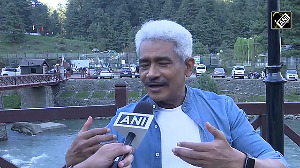President General Pervez Musharraf made the following appointments in the Pakistani Armed Forces on October 2, 2007:
- Lt Gen Ashfaq Pervez Kiyani, presently director-general of the Inter-Services Intelligence (DG, ISI), promoted as general and appointed as the Vice-Chief of Army Staff in place of General Ahsan Saleem Hayat.
- Lt Gen Tariq Majeed, presently Corps commander, Rawalpindi, promoted as General and appointed as chairman, Chiefs of Staff Committee, in place of General Ehsanul Haq.
Lt Gen Kiyani and Lt Gen Majeed will take over on October 8, 2007, when the present incumbents of these two posts retire. On the same day, Maj Gen Nadeem Taj, the commandant of the Pakistan Military Academy, will stand promoted to the rank of Lt General and will take over as the DG, ISI. The appointment of Nadeem Taj as the new DG of the ISI was announced by Musharraf on September 21.
Taj has already started informally functioning as the DG, but he has not yet formally taken over.
As the VCOAS, Kiyani is expected to take over as the COAS when Musharraf sheds that post if he is re-elected as the President. He has already made a promise to the Supreme Court that if re-elected as the President, he would relinquish the post of COAS. At the same time, his staff indicated that if he is not re-elected, he would continue to function as the COAS. Barring unpredicted surprises, he should be able to get himself re-elected with his engineered majority in the National Assembly and the provincial assemblies.
In choosing Kiyani, Musharraf has stuck to the principle of seniority and avoided any supersession. Kiyani is the senior-most serving Lt Gen in the Pakistan Army. Lt Gen Khalid Ahmed Kidwai, presently Director-General of the Strategic Plan Division, is senior to Kiyani, but is already on extension after crossing his age of superannuation. Tariq Majeed is No 4 in the seniority list. Lt Gen Malik Arif Hayat, presently holding a staff post in the General Headquarters, is No 3, but he had never commanded a Corps and hence was not eligible for further promotion.
If and when Kiyani takes over as the chief, he will have the distinction of being the first DG, ISI, to be appointed as the COAS since Pakistan became independent in 1947. Ehsanul Haq was also the DG, ISI, before he became the CCSC. Kiyani would also have another first to his credit.
This would be the first time in the history of the Pakistani Army that a son of a non-commissioned officer of the Army would head the Army. His humble background as the son of an NCO has endeared him to the junior ranks of the Army. At a time, when there are signs of some demoralisation in the junior ranks fighting against Al Qaeda and other jihadi organisations in the Pashtun belt, high hopes will be placed on him for reversing the process of demoralisation.
Kiyani is also a non-controversial officer, who had in the past not come to notice for any dubious association with the Taliban or Al Qaeda or any of Pakistan's fundamentalist organisations. He was liked by the political leaders, who were attracted by his unassuming nature and humble demeanour. A man of few words, he is quite a contrast to Musharraf, a braggart.
Kiyani's reputation as an apolitical officer went up during the recent controversy over Musharraf's suspension of Chief Justice Iftikhar Mohammad Chaudhury of the Pakistan Supreme Court. Knowledgeable sources said that at the meeting held at Musharraf's office at which the decision to suspend him was taken, Kiyani was the only person, who kept quiet and did not utter a word either in support of Musharraf's decision or in criticism of the Chief Justice. It was also reported that he kept the ISI out of this unsavoury controversy and that it was the Directorate-General of Military Intelligence and the Intelligence Bureau, which played the leading role in the campaign to denigrate the Chief Justice, which ultimately boomeranged on Musharraf.
Kiyani, who joined the Pakistan Army in 1970, started his career in the Baloch Regiment as an infantryman He did not come to public notice till Benazir Bhutto, during her first tenure as the Prime Minister (1988-90), chose him as her deputy military secretary. The two have since maintained their personal friendship despite the ups and downs in her political career.
Kiyani, who had done some training courses in the US, is believed to have a wide network of contacts in the US Armed Forces, but he really attracted the attention of the US' political and military leadership at the time of the Indo-Pakistan military confrontation in 2002 after the terrorists attack on the Indian Parliament on December 13, 2001. He was the Director-General, Military Operations, at that time and the US was reportedly impressed by the cool manner in which he handled the crisis.
In September 2003, he was appointed corps commander of the X Corps at Rawalpindi. It was the X Corps that launched the coup of October 1999 that brought Musharraf to power. As corps commander, Musharraf made him responsible for coordinating the investigation into the two attempts to assassinate him in Rawalpindi in December,2003. Apart from identifying some of the jihadi terrorists responsible for the attempts, he also managed to establish the involvement of some junior officers of the Army and the Air Force in the attempts and had them arrested.
In October next year, he was appointed the DG of the ISI and once again impressed the US by his success in having Abu Faraj al-Libbi, al Al Qaeda operative allegedly involved in the attempts to assassinate Musharraf, arrested in the tribal belt. He was immediately handed over to the US without properly interrogating him in connection with the attempts to kill Musharraf. Many Pakistani sources, however, have not accepted his claim and that of the US that Abu Faraj was the No 3 of Al Qaeda and had masterminded attempts to kill Musharraf. Subsequent evidence has not proved their claims.
Even though he has been projected as a highly successful DG of the ISI, facts speak otherwise. It was during his tenure as the DG of the ISI that the 'Neo Taliban' staged a come-back with a bang, the Pakistan Army practically lost control over the Pashtun belt and Al Qaeda established its sanctuaries in Pakistani territory.
The US has strongly backed his elevation as the COAS because of his known loyalty to Musharraf, his friendship with Benazir Bhutto and its hopes that he would improve the morale of the Army and vigorously pursue Al Qaeda & co. Its hopes in him may ultimately be belied just as its hopes in Musharraf were. The US has never been a good judge of Pakistanis and particularly of Pakistani Army officers. Will it be different this time? Let us wait and see.
(The writer is Additional Secretary (retired), Cabinet Secretariat, Government of India)







 © 2025
© 2025